
Madiha Murshed
Trainer, Educationist
For students to grow intellectually and creatively, to become global individuals and work for the society, education needs to be interactive. Syeda Madiha Murshed is someone who has been working to establish such an education system for years now.
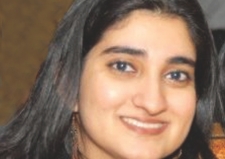 |
|
Photo:Courtesy |
Madiha Murshed is the Managing Director of Scholastica, a leading English-medium school in Bangladesh. She is also the Executive Director of SPEED, a training centre based in Dhaka. She has been working in the fields of education and youth development for ten years, in the United States of America and Bangladesh. She received a Bachelor's Degree in Economics from Harvard University and has a Master's degree from Columbia University's School of International and Public Affairs. She is also the Co-Founder and Member of the Board of Directors of World Savvy, an educational nonprofit organisation based in the United States.
“We have to create classrooms where students are encouraged to learn independently (without needing guidance from the teacher), ask questions and think critically about what they read, and take up intellectual challenges. These are the key characteristics of modern teaching methods that I emphasise in all my trainings and in my work,” says Murshed.
She is a person who believes in the unending venture of learning. “I love seeking out ways to do things better and offer better services and programmes to our students so that our school is always evolving, learning and improving,” she says.
According to Murshed, a teacher should have some basic qualities such as open-mindedness, humility, patience, and the eagerness to learn and do better. She loves working for the youth and seeing positive outcomes through effective teaching. “The satisfaction you get when students feel empowered through learning is unparalleled,” points out Murshed.
Madiha Murshed is an adventurous soul, who has dedicated herself to take the education standard in Bangladesh to new heights.
By Saad Adnan Khan
Baddrun Nahar
Writer
A campaigner for the rights of the adivasis, a specialist in writing stories for children with a keen sense of understanding of the country's current affairs, Badrun Nahar, a 35-year-old writer from Madaripur, has done it all. Her tryst with writing began as a child in a regional daily in Faridpur that frequently published her poems. Today Nahar has gone on to become one of the most established young writers of the country with her work getting published both in and outside Bangladesh. It was Nahar's mother who inspired her to follow this route. “As a child my mother used to talk to me in rhymes and often gave examples of ancient poems. I came to know the value of many of those poems as I was growing up,” says Nahar.
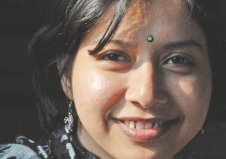 |
|
Photo:Nasir Ali Mamun |
As a student, Nahar was always involved in extra-curricular work and frequently participated in club activities and demonstrations. “I used to have a lot of restrictions from home regarding my participation in such activities, but I somehow always managed to convince my parents to let me go,” explains Nahar. Her involvement with one such group was one of the main factors that influenced her to take up writing as a profession years later. The group Bhoomi Joy discusses several socially relevant issues and has also come up with its own publications.
Although Nahar was a student of Economics and eventually obtained a Masters Degree in the subject, deep inside, she always saw herself as a writer. This is perhaps one of the reasons why she prefers being a full time writer rather than working in a '9 to 5' environment. “I worked in three media companies before I decided to become an independent writer,” she says. She also worked as a writer for 'Sisimpur', Bangladesh's version of Sesame Street, an American-based education show that caters to children. Describing her role in the TV show she says, “We had to come up with innovative ideas to teach children. We had to write scripts that helped children learn in a fun way.” This was perhaps the inspiration behind her latest book entitled 'Cockroach Nockroach' which she dedicates to the children of the country.
As a writer, Nahar generally prefers writing stories about the problems and achievements of our society. From stories related to Mohammad Yunus and the Nobel Prize to the problems faced by workers in the garments sector, Nahar's stories always contain enlightening messages for the readers. Some of her stories have also been converted to plays by educational institutes.
Ever since the release of her first book in 2006, "Golpo Gulo Boditer", Nahar has followed a path that not many would have. Despite a firm education background and several possible employment opportunities, Nahar has decided to follow her heart and continue being a full time writer. Following the path that many legends have, it wouldn't be a surprise to see Badrun Nahar in those ranks in the near future.
By Naimul Karim
Dr Tahmima Anam
Writer
Dr Anam studied Social Anthropology at Mount Holyoke College. She later got a PhD in Social Anthropology from Harvard University. She completed an MA in Creative Writing, and two years later, published her first novel, "A Golden Age".
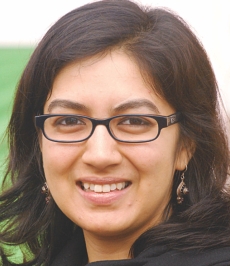 |
|
Photo:Star File |
Talking further about her educational life, Tahmima says, "I began my BA degree without any idea of what Social Anthropology was. I had thought of studying Psychology or Political Science, but I took an introductory course, and the professor inspired me to pursue the field."
Like many others, Tahmima also faced a lot of difficulties reaching her goal. But none of them were enough to stop her from pursuing a career in writing. She says, "It was difficult to make the transition from my academic background into writing novels. There is no established way of getting a book published, you just have to keep writing to agents and publishers and hope that someone will take an interest in your work. Lucky for me, a publisher read an extract of my book and wrote back to me, and she became my editor."
Although Tahmima lives in London, her heart is in Bangladesh, and she has many projects in the pipeline. "Last year, my colleague, Sadaf Saaz Siddiqui (in collaboration with the British Council and The Daily Star) helped me set up the first ever international literary festival in Dhaka," says Tahmima. She adds, "Hundreds of people attended and it was a great success. This year, we hope to put up an even bigger and better festival, with more authors from Bangladesh and abroad. And we are thinking of ways to encourage English-language publishing in Bangladesh."
Tahmima has a lot of faith in her country despite the distance. Seeing Bangladesh in a global context in the next 10 years, she says, “Bangladesh is already a great success story. Given all the challenges we have faced as a nation--economic, political, and environmental--we have overcome incredible odds and reached a point where our economic stability is within reach. I hope this potential can be fulfilled, so that we can give our future generations an inheritance that they can be proud of."
By Naziba Basher
Nirlipto Noyon
Writer, Poet
Nirlipto Noyon completed both his Bachelors and Masters from Jahangirnagar University on Drama and Dramatics. He worked for Shamakal as a Literature editor but had to leave work for his exams. He has been writing since he was in the Class 8.
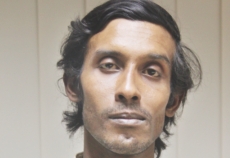 |
"One of my biggest inspirations was my father during my early years of writing. I had a very big library at home and grew up reading Russian Literature. Since I have always had a problem with my leg and I could not play like the other boys, I naturally grew an interest towards reading," says Noyon. He adds, "Everytime I read a good book, I would feel the authors and writers living in their own world, a world I imagined to be very different from the real world and I wanted to be a part of it!" By the time he had to get ready for his SSC exams, Noyon had become obsessed with reading and writing. His parents wanted him to quit writing and focus on studies but he could not. Writing had become his passion. "When my family wanted me to quit writing, it was much too late then. I was in love with it. Writing was and is my life and I refused to give it up. I left home with no money. I got myself a job as a contributor at a newspaper office and earned as much as I could on my own," says Noyon.
Noyon had first applied to study Fine Arts at the Institute of Fine arts, popularly known as Charukola at the Dhaka University. However, he opted to study Drama and Dramatics in Jahangirnagar University with Selim Al Deen, a phenomenal playwright of the era who passed away a few years ago. "Selim Al Deen is someone who has been a huge influence and inspiration to me. He made me realise the value of my talents, showed me how to use them properly and made sure that I cherished them." He worries that, in spite of being Bengali, a lot of people in Bangladesh do not pay as much attention to Rabindranath Tagore's literature as they do to other writers across the world. "Yes, it is a fact that everybody respects Rabindranath but very few know his literature closely. Selim Al Deen is the person who brought Tagore's literature to light for me. He sat with me for hours and made me read "Mongol Kabbo"," says Noyon.
Noyon had also faced a lot of other social barriers, was ill-treated by others who had underestimated him as 'the boy from the mafashshal', and crushing his dreams in the process. But he did not let that stop him from dreaming it all. He knew he wanted to be a writer and he made sure that his dream would come true. He says, "Getting into Jahangirnagar actually helped me a lot and I could look past a lot of social problems that I had faced while growing up. People started believing in me without judging me harshly."
Noyon does not believe in strictly categorising his own genre of writing. "Contemporary literature has not reached the mass population of our country yet. The mass population should get involved in culture. I hope I can adapt my culture in my writing and bring about a positive impact on the people. I want my readers to read my writing however they want to. If they want to treat it like a poem, then let it be known as a poem. If they would rather it is a story, then a story it is!" says Noyon.
When it comes to the future, Noyon believes that, even though the age of the pen and paper is fading away, there are still people who write their hearts out and hopefully Bangladesh will go further in the literature era as long as those writers do not give up. With regards to the social context, he has rather different views. He says, "Due to the fast pacing world, people have stopped reading. Everybody looks for the easy way out now. We waste time when we could use that time to read a good book, listen to a good song or write a story. Our ability to think is being eradicated. I am not sure the next generation will be able to get out of that trap. But then again, I am hoping the younger generation has something to gain out of their new hobbies. I dream big for my country but I am still not sure if that dream will someday turn into reality or whether it will remain a dream forever."
By Naziba Basher
Dr A Q M A Rahman Bhuiyan
Assistant Professor
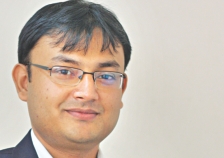 |
|
Photo:Tousif Farhad |
They say some people are gifted and are born with immense potential. AQMA Rahman Bhuiyan is one such figure whose academic achievements speak for themselves. His role in the field of academia is immense for a young man of his age. Bhuiyan, being brought up in four different parts of the world, has a much liberal perspective to life. His Undergraduate and Master's years were spent at Delhi University, where he studied English Literature. Bhuiyan was always quite competent in academics. In his undergrad years, he was the second topper in his first year annual exam. Later on, in his Master's entrance exam, he did outstandingly well. At a very young age Bhuiyan pursued an MPhil and later a PhD from Jawaharlal Nehru University in India under the Junior Research Fellowship, leading to the Senior Research Fellowship in Science & Humanities. Being an international student in India, life might have been easy in the university dorm where daily amenities and responsibilities were all taken care of, but the challenge to coexist in a competitive institution and balancing a sprawling discipline was what he had to learn to accommodate.
As a wise man once said, to find what you seek in life, leave no stone unturned. For Bhuiyan, it was much like that. In high school, Bhuiyan was intrigued by a particular course titled Theory of Knowledge, which was a part of his International Baccalaureate diploma requirement. He also enjoyed the science of politics, biology, chemistry, history and economics. Taxing issues always made him delve deeper and venture into areas which were yet to be discovered. His English teachers at school and his father's constant encouragement eventually helped him determine his niche. Literature, unlike other subjects was a relaxation for his soul. His mentors taught him to look into a book as if it were some kind of a map, to find oneself through someone else's experience. Bhuiyan took pleasure in reading books and believes it was time worth spent. Even though, he was brought up like many children growing up in Britain on action figures and “transformers” and later in Japan during, an era marked in history, as a period of video games and anime, given all the distractions, Bhuiyan did manage to ace his academics.
Authors who inspire Bhuiyan are the all time classic literary figures like Herman Melville and George Eliot. Some of their works have cast a spell on Bhuiyan. The authors' power to grasp on to delicate and finer details of life amazes Bhuiyan. He claims that the traditional ways of narration are missing in contemporary works. Today, novels are sporadic bursts of an information overload which almost instantaneously solidifies in room temperature and lacks fluidity. In addition, writers like Yann Martel, are among his favourites as well. The author's ability to turn the unbelievable sound credible is an aspect that Bhuiyan finds particularly brilliant.
Bhuiyan chose an unconventional field of study for someone who held high science and math grades in high school. The biggest hurdle he had to overcome were the voices among his extended kin-folk, of how he could have done much more with his life by becoming a doctor or an investment banker. Apart from this, internal struggles which he had to face as an MPhil candidate, meeting deadlines for his dissertation, given the short length of the programme, Bhuiyan had to strive hard to put his thoughts into words, compiling original, creative works.
Apart from teaching Literature in Bangladesh, he plans to further investigate some of the new avenues in English literature. His MPhil and PhD thesis were titled, “From Bombay to Boston: Location of Homi K Bhaba” and “Life and Times of Theory: Identity, agency and the will to justice” respectively. Bhuiyan's Doctoral thesis attempts to answer some fundamental questions as to why separate bodies of literature such as African-American literature, Dalit literature, regional or national identitarian writings and other erstwhile “marginal” areas of identity based inquiry exist as part of the English curriculum today. These works are also being considered for publication by respectable publishing houses.
Bhuiyan believes that Bangladesh as a nation can reach great heights. The socio-economic indicators are rising and a great deal of change is coming about. He asserts that there will be an increase in genuine general interest in literature amongst the youth. Currently, there are a number of students enrolling in English language courses throughout the city. And eventually this figure will spill over and lead to a significant rise in interest in literature amongst the new generation.
By Sumaiya Ahsan Bushra